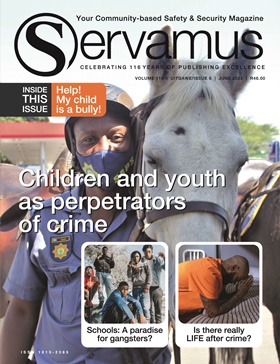By Annalise Kempen
Forensic science and the application thereof have become more familiar to the public mostly due to television programmes such as the infamous CSI and NCIS that feature some of the forensic methods commonly used to solve crime. We have also become accustomed to the fact that forensic experts such as those on ballistics or forensic psychologists can be called to testify during a court case on matters pertaining to their field of expertise. And yet, despite seeing more about forensic science on our television screens, not everyone understands what this form of science entails. That is why it is important to remind our readers that "forensic science is the use of scientific methods or expertise to investigate crimes or examine evidence that might be presented in a court of law. Forensic science comprises a diverse array of disciplines, from fingerprint and DNA analysis to anthropology and wildlife forensics" (NIST, nd).
Just when I thought that almost all the disciplines have been covered in forensic science, I recently heard about forensic linguistics. Ironically, this term was first used more than 50 years ago in 1968 by Prof Jan Svartvik (Ariani, Sajedi and Sajedi, 2014). At that time, this Swedish professor was analysing the language used in a set of legal statements that had been made by people who had been accused of crimes and whose statements had been given to the police. Prof Svartvik's analysis helped to secure several convictions and helped police to understand how language holds clues about someone's guilt or knowledge of an event, or innocence. Following on this, the field of forensic linguistics developed into an established research area in Europe, Australia and New Zealand (Docrat and Kaschula, 2019).
What is forensic linguistics?
Forensic linguistics involves the application of scientific knowledge to language in the context of criminal and civil law. Forensic linguists have an interest in understanding the language of the written law, its complexity and origin, as well as the use of language in forensic procedures. These experts also study the judicial process from the point of arrest and through the interview, charge, trial and sentencing stages. Here is an example: Linguists are interested in the language of police interviews with witnesses and suspects, and in the language of lawyers and witnesses in cross-examination (AHRC, 2009). For them it is about improving the delivery of justice by using language analysis (Rhodes University, 2017). Or as Prof Heydon, a professor in Criminology and Justice Studies at RMIT University explains, since linguistics is the scientific study of language, linguists are uniquely placed to provide expert opinions about how language is used (Heydon, 2020).
Dr Richard Nordquist, a professor emeritus of rhetoric and English at Georgia Southern University, explains that forensic linguistics refers to the application of linguistic research and methods to the law, including evaluation of written evidence and the language of legislation. One way to look at forensic linguistics is to think about language as if it is a fingerprint that can be studied and analysed to the point that language can help us to solve and prevent crimes. When studied and applied correctly, the work and analysis done by forensic linguists can make the difference of whether someone goes to prison due to a confession that he or she did not write (Nordquist, 2019).
Another concept that has been mentioned by some researchers is the so-called "linguistic fingerprint" which refers to the notion that each person uses language differently and that this difference between people can be observed as easily and surely as a fingerprint. Thus, in theory at least, a linguistic fingerprint is a collection of markers which stamps each speaker or writer as unique (Nordquist, 2019).
In as much as we each have a unique writing style (see more below in "Did you know?), the how and what we write are also unique in the sense that every person uses unique language characteristics. This helps forensic linguists to compare different documents to determine whether they have been written by the same author. It is as if we each have a personal version of language where each one of us prefers a certain word or phrase over another to say the same thing or have a different writing style or interpretation of grammar from another. In some cases this personal language may be so unique that it will enable a linguist to determine whether two documents have been written by the same person (Crime Museum, nd).
******************************
[This is only an extract of an article that is published in Servamus: April 2023. The rest of the article looks at the application of this form of forensics; the challenges faced by forensic linguistics and the situation in South Africa. If you are interested in reading more, send an e-mail to: This email address is being protected from spambots. You need JavaScript enabled to view it. or a WhatsApp to: 078 712 1745 to find out what you have to do. Ed.]








